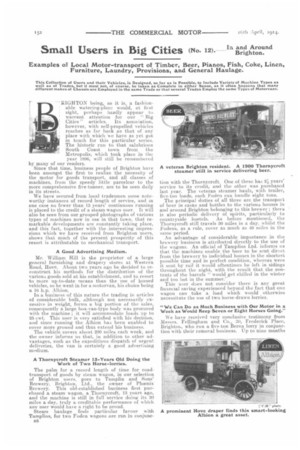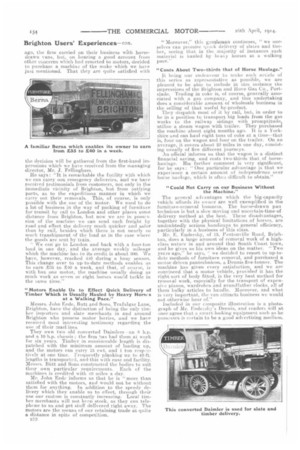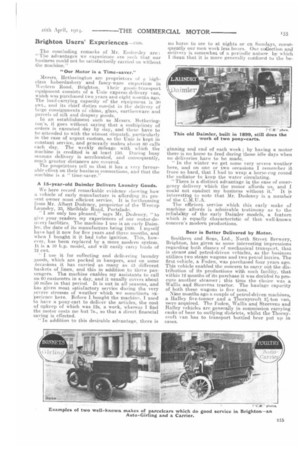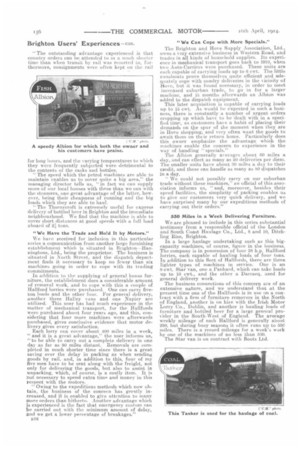Small Users in Big Cities (No. 12).-and Around
Page 4

Page 6

Page 7

Page 8

If you've noticed an error in this article please click here to report it so we can fix it.
Brighton.
Examples of Local Motor-transport of Timber, Beer, Pianos, Fish, Coke, Linen, Furniture, Laundry, Provisions, and General Haulage.
This Collection of Users and their Vehicles, is Designed, so far as is Possible, to Include Variety of Machine Types as well as of Trades, but it must not, of course, be taken as Complete in either Sense, as it often happens that many different makes of Chassis are Employed in the same Trade or that several Trades Employ the same Types of Motorvans.
.1sZIGHTON being, as it is, a fashionable watering-place would, at fist sight, perhaps hardly appealto warrant attention for our " Big Cities " articles. Its association, however, with self-propelled vehicles reaches as far hack as that of any place with which we have as yet got in touch for this particular series. The historic run to that salubrious South Coast town from the Metropolis, which took place in the year 1896, will still be remembered
by many of our readers. Since that time, business people of Brighton have been amongst the first to realize the necessity of the motor for goods transport, and all classes of machines, from the speedy little parcelcar to the more comprehensive five-tonner, are to be seen daily in its streets.
We have secured from local tradesmen some noteworthy instances of record length of service, and in one case no fewer than 13 years' continuous running is placed to the credit of a steam wagon user. It will also be seen from our grouped photographs of various types of machines now in use in that town, that remarkable developments are constantly taking place, and this fact, together with the -interesting impressions which we have received from Brighton users, shows that much of the present prosperity of this resort is attributable to mechanical transport.
A Good Advertising Medium.
Mr. William Hill is the proprietor of a large general furnishing and drapery stores at Western Road, Hove. About two years ago he decided to reconstruct his methods for the distribution of the various goods sold at his establishment, and to resort to more up-to-date means than the use of horsed vehicles, so he went in for a motorvan, his choice being a 16 h.p. Albion.
In a business of this nature the trading in articles of considerable bulk, although not necessarily excessive in weight, forms a big portion of the sales, consequently a large box-van-type body was procured with the machine ; it will accommodate loads up to 25 cwt. This user is very satisfied with his decision, and since running the Albion has been enabled to cover more ground and thus extend his business.
The vehicle covers about 200 miles each week, and the owner informs us that, in addition to other advantages, such as the expeditious dispatch of urgent deliveries, the van is certainly a good advertising medium.
A Thornycroft Steamer 15-Years Old Doing the Work of Two Horse-lorries.
The palm for a record length of time for roadtransport of goods by steam wagon, in our selection of Brighton users, goes to Tamplin and Sons' Brewery, Brighton. Ltd., the owner of Phcenix Brewery. This old-established business first purchased a, steam wagon, a Thornycroft, 13 years ago, and the machine is still in full service doing its 30 miles a day, truly a creditable performance of which any user would have a right to be proud.
Steam haulage finds particular favour with Tamplins, for two Foden wagons are run in conjunc538
tion with the Thornycroft. One of these has VI years' service to its credit, and the other was purchased last year. The veteran steamer hauls, with trailer, five-ton loads, each Foden can handle eight tons.
The principal duties of all three are the transport of beer in casks and bottles to the various,houses in and around Brighton belonging to this brewer ; there is also periodic delivery of spirits, particularly to countryside hostels. As before mentioned, the Thornycroft still travels 30 miles in a day, whilst the Fodens, as a rule, cover as much as 40 miles in the same period.
An advantage of considerable importance in the brewery business is attributed directly to the use of the wagons. An official of Tamplins Ltd. informs us that the maohines, enable the beer to be sent direct from the brewery to individual houses in the shortest possible time and in perfect condition, whereas were it sent by rail it would oftentimes be left in sidings throughout the night, with the result that the contents of the barrels " would get chilled in the winter and too hot in the summer."
This user does not consider there is any great financial saving experienced beyond the fact that one wagon can take a load which wouldotherwise necessitate the use of two horse-drawn lorries.
"We Can Do as Much Business with Our Motor in a Week as Would Keep Seven or Eight Horses Going."
We have received very conclusive testimony from Messrs. Fellingham and Co., 30, Frederick Place, Brighton, who run a five-ton Berns, lorry in conjunction with their removal business. Up to nine months ago, the firm carried on their business with horsedrawn vans, but, on hearing a good account from other concerns which had resorted to motors, decided to purchase a machine of the make which we have just mentioned. That they are quite satisfied with the decision will be gathered from the first-hand impressions which we have received fronk the managing director, Mr. J. Fellingham.
He says : It is remarkable the facility with which we can carry out emergency deliveries, and we have received testimonials from customers, not only in the immediate vicinity of Brighton, hut from outlying parts, as to the expeditious manner in which we carry out their removals. This, of course, is only possible with the use of the motor. We used to do a lot of business in the way of packing of furniture for transit by rail to London and other places some distance from Brighton, but now we are in possession of the machine we can send such freight by road and effect the delivery much quicker and safer than by rail, besides which there is not nearly so ninth transhipment of the load as in the case where the goods are sent by train.
" We can go to London and back with a four-ton load in one day, and the average weekly mileage which the machine has to its credit is about 300. We have, however, reached 410 during a busy season. This ehange over to up-to-date methods enables us to earn £35 to £40 a week, and that, of course, is with but one motor, the machine usually doing as much work as seven or eight horses would tackle in the same time."
"Motors Enable Us to Effect Quick Delivery of Timber Which is Usually Hauled by Heavy Horsr s at a Walking Pace."
Messrs. John Eede, Butt and Sons, Trafalgar Lane, Brighton, have the distinction of being the only timber importers and slate merchants in and around Brighton who possess motor lorries, and we have received most interesting testimony regarding the use af their maelines.
They own two old converted Daimlers -an 8 h.p. and a 10 h.p. chassis ; the firm ia.s had them at work for six years. Timber in ennsiderable length is dispatched with the minimum amount of loading up, and the motors can carry le cwt. and 1 ton respectively at one time. Frequently plankieg up to 40-ft. lengths is transported, anrIthis with ease and facility. Messrs. Biitt and Sons constructed the bodies to suit their own particular requirements. Each of the machines is credited with 40 miles a day.
Mr. John Fade inform.s us that he is "more than satisfied with the motors, and would not be without them for anything. In addition to the speedy delivery which they enable us to effect, through their use our custom is constantly increasing. Local timber merchants will not keep stock, as they can telephone to us and get stuff delivered right away. The motors are the means of our retaining trade at quite a distance in spite of competition.
"Moreover," thk g:uitleinan continues, " we ourselves can promise reAck delivery of slates and timber, seeing that in the majority of instances such material is hauled by heaay horses at a walking pace," "Costs About Two-thirds that of Horse Haulage."
It being our endeavour to make each article of this series as representative as possible, we are pleased to be able to include in this instance the impressions of the Brighton and Hoye Gas Co., Portslade. Trading in coke is, of course, generally associated with a, gas company, and this undertaking does a considerable amount of wholesale business in the selling of that useful by-product.
They dispatch most of it 'ey rail, but, in order to be in a position to transport big loads from the gas works to the railway sidings with promptitude, utilize a steam wagon with trailer. They purchased the machine about eight months ago. It is a Yorkshire and can haul eight tons of coke at a time—that is, four on the wagon and four on the trailer. On an average, it covers about 20 miles in one day, consisting usually of five different journeys.
_An official informs us that the wagon is a distinct financial saving, and costs two-thirds that of horsehaulage. His further comment is very significant, for he says: " One particular advantage is that we experience a certain amount of independence over horse haulage, which is often difficult to obtain."
"Could Not Carry on our Business Without the Machine."
The, general advantages which the big-capacity vehicle affords its owner are well exemplified in the furniture-removal business, The horse.drawn pan.
technieon is but a slew-moving and uncertain-time-or delivery method at the best,These disadvantages, together with the physical limitations of horses, are undoubtedly serious handicaps to general efficiency, particularly in a business of this class.
Mr. E. Endersby, of 15, Bentonville Road, Brigh ton, does a large amount of removal work of a highclass nature in and around that South Coast town, and he gives as his own ideas on the matter. " Two years ago," he says, we decided to resort to up-todate methods of furniture removal, and purchased a motor-driven pantechnicon, a Dennis five-tonner. The machine has given every satisfaction, and we are convinced that a motor vehicle, piovided it has the right sort of body fitted, is the very best method for removal work, especially for the transport of expensive pianos, wardrobes and grandfather clocks, all of them. bulky articles to handle. Moreover, and what is very important, the van attracts business we would not otherwise hear of."
Included in our composite illustration is a photograph of Mr. Endeleiley's Dennis, and readers will at once agree that a smart-looking equipment such as he poss:ssesi pertain to be a geed advertising medhan. The concluding remarks of Mr. Eialersley are: "The advantages we experience are such that our business could not be satisfactorily carried on without the nuichine."
"Our Motor is a Time-saver."
Messrs. Hetherington. are proprietors of a highclass haberdashery and fancy-ware emporium in Western Road, Brighton. Their goods-transport equipment consists of a Urdu express-delivery van, which was purchased two m
years a" eight months ago. The load-carrying capacity of the equipment is :30 cwt., and its chief duties consist in the delivery of large consignments of china, glass, earthenware and parcels of silk and drapery goods. In an establishment such as Messrs. Hetherington's, it goes without saying that a multiplicity of orders is executed day by day, and these have to be attended to with the utmost dispatch, particularly in the ease of urgent custom, so the Unic is kept in constant service, and generally makes about 60 calls each day. The weekly mileage with which the machine is credited is at least 150. During busy seasons delivery is accelerated, and consequently, much greater distances are eovered. The proprietors tell us that it has a very favourable effect on their business connections, and that the machine is a " time-saver."
A 15-year-old Daimler Delivers Laundry Goods.
We here record remarkable evidence showing how a vehicle of early manufacture is affording its present owner most efficient service. It is forthcoming from Mr. Albert Dudeney, proprietor of the Westup Laundry, 33, Shelldale Road, Portslade.
" I am only too pleased," says Mr. Dudeney, 'to give your-readers my experiences of our motor-deiivery facilities. The machine I use is an early Daimler, the date of its manufacture being 1890. I myself have had it now for five years and three months, and when I bought it it had tube ignition. This, however, has been replaced by a more modern system. It is a 10 h.p. model, and will easily carry loads of 12 ewt.
'• I use it for collecting and delivering laundry goods, which are packed in hampers, and on some Lecasions -it has carried as many as 43 different baskets of linen, and this in addition to three passengers. The machine enables my assistants to call en 60 customers in a day, and it usually covers about 50 miles in that period. It is out in all seasons, and has given most satisfactory service during the very severe stresses ot weather which we sometimes ,sxPerience here. Before I bought the machine, I used to have a pony-cart to deliver the articles, the cast of upkeep of which was 12& a week, whereas I find the motor costs me but 7s., so that a direct financial saving is effected.
" In addition to this desirable advantage, there is no horse to see to at nights or cn Sundays, consequently our men work less hours. Our coilection and delivery is somewhat of a periodic nature_ by which I iTiean that it is more generally confiured to the he
ginning and end of each week ; by having a motor there is no horse to feed during those idle days when no deliveries have to be made.
" In the winter we get some very severe weather here, and on one or two occasions I remember it froze so hard, that I had to wrap a horse-rug round the radiator to keep the water circulating. " There is a distinct advantage in the ease of emergency delivery which the motor affords us, and / eouki not conduct my business without it." It Is interesting to note that Mr. Dudency is a member of the C.M.U.A.
The efficient service which this early make of machine affords is admirable testimony as to the reliability of the early Daimler models, a feature which is equally characteristic of that well-known Concern's modern productions.
Beer is Better Delivered by Motor.
Smithers and Sons, Ltd., North Street Brewery, Brighton, has given us sortie interesting impressions regarding both classes of mechanical transpc.rt, that is steam' and petrol-driven vehicles, as the business utilizes two steam wagons and two petrol lorries. The first vehicle, a Foden, was purchased four years ago. This vehicle enabled the concern to carry out the.distribution of its productions with such facility, that within 12 months of its purchase it was decided to procure another steamer ; this time the choice was a. Wallis and Steevens tractor. The haulage capacity of both these wagons is five tons. Nine months ago a couple of petrol-driven machines, a Halley five-tonner and a Thornycroft '2-ton van, were acquired. The Foden, Wallis and Steevens and Halley vehicles are generally in commission carrying casks of beer to outlying districts, whilst the Thorny croft van has to transport bottled beer put up in cases.
" The outstanding advantage experienced is that country orders can be attended to in a much shorter time than when transit by rail was reaorted to, furthermore, consignments were often kept on the rail for long hours, and the varying temperatures to which they were frequently subjected were detrimental to the contents of the casks and bottles.
"The speed which the petrol machines are able to maintain enables us to cover quite a big area," the managing director tells us "in fact we can supply more of our local houses with these than we can with the steamers, one great advantage of the latter, however, being their cheapness of running and the big loads which they are able to haul.
" The Thornycroft is extremely useful for express delivery of bottled beer in Brighton and the immediate neighbourhood. We find that the machine is able to cover short distances at good speeds with a full load aboard of 2Z, tons.
"We Have the Trade and Hold It by Motors?'
We have received for inclusion in this particular series a communication from another large furnishing establishment which is situated in Brighton—Hanningtons, Ltd., being the proprietor. The business is situated in North Street, and the dispatch department finds it necessary to keep no fewer than six machines going in order to cope with its trading commitments.
In addition to the supplying of general house furniture, the establishment does a considerable amount of removal work, and to cope with this a (ample of Hallford lorries were purchased. One can carry fiveton loads and the other four. For general delivery, another three Halley vans and one Napier are utilized.This user has had much experience in the. matter of mechanical transport, for the Hallfords were purchased about four years ago, and this, considering that four more machines were afterwards purchased, gives conclusive evidence that motor delivery gives every satisfaction.
Each lorry can cover about 400 miles in a week, " and it is a great advantage," the user informs us, "to be able to carry out a complete delivery in one day as far as 90 miles distant. Removals are completed in much shorter time since there is a great saving over the delay in packing as when sending goods by rail, and, in addition to this, four of my five men have to be sent along with the freight, not Oily for delivering the goods, but also to assist in unpacking, which, of course, is a costly item. It is not necessary to spend extra time and money in this respect with the motet's.
Owing to the expeditious methods which now obtain, the business of the concern has greatly inereased, and it is enabled to give attention to many more orders than hitherto. Another advantage which is experienced is the fact that emergency custom can be carried out with the minimum amount of delay, and we get a lower percentage of breakages,"
pl 6
"We Can Cope with More Specials."
The Brighton and Hove Supply Association Ltd., owns a very extensive business in Western Road, and trades in all kinds of household supplies. Its experience in mechanical transport goes back to 1910, when two Auto-Carriers were purchased. These units are each capable of carrying loads up to 6 cwt. The little runabouts prove themselves quite efficient and &Lequately cope with sundry deliveries in the vicinity of Hove, but it was found necessary, in order to meet increased suburban trade, to go in for a, larger machine, and lb months afterwards an Albion was added to the dispatch equipment. This later acquisition is capable of carrying loads up to 15 cwt. As would he -expected in such a business, there is constantly a number of urgent orders cropping up which have to be 'dealt with in a specified time, as customers have a habit of placing their demands on the spur of the moment when they are in Hove shopping, and very often want the goods to await them on thr ir return home. Particularly does this owner emphasize the advantage which the machines enable the concern to experience in the way of handling " specials.' The Albion generally averages about 60 miles a day, and can effect as ninny as 50 deliveries per diem, The smaller units have about 30 miles a day to their credit, and these can handle as many as 80 dispatches in a day.
" We could not possibly carry on our suburban trade without these machines," an official of this association informs us, "and, moreover, besides their speed facilities, the simplicity of packing enables us to give our customers very quick delivery, and we have surprised many by our expeditious methods of carrying out their orders."
530 Miles in a Week Delivering Furniture.
We are pleased to include in this series substantial testimony from a responsible official of the London and South Coast Haulage Co., Ltd-, 8 and 10, Ditchling Rise, Brighton.
In a large haulage undertaking such as this bigcapacity machines, of enurse, figure in the business. The company is in. possession of four 38 h.p. Hanford lorries, each capable of hauling loads of four tons. In addition to this fleet of Halifords, there are three lighter types of machines in service. One is an 8-cwt. Star van, one a Panhard, which can take loads up to 10 cwt., and the other a Darraeq, used for general delivery work.
The business connections of this concern are of an extensive nature, and we understand that at the present time one of the Hallfords is in use on a contract with a firm of furniture removers in the North of England, another is on hire with the Irish Motor Lorry Co., Dublin, and another is hauling loads of furniture and bottled beer for a large general provider in the South-West of England. The average weekly mileage of each Hallford is generally about .250, but during busy seasons it often runs up to 550 miles. There is a record mileage for a week's work by one of the machines of no less than 530.
The Star van is on contract with Boots Ltd.
























